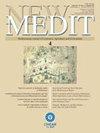突尼斯橄榄种植系统的可持续性评估与分析
IF 1.2
4区 经济学
Q3 AGRICULTURAL ECONOMICS & POLICY
引用次数: 0
摘要
本文旨在评估和分析突尼斯橄榄种植系统的可持续性。结果显示,该行业有两种类型的农场。第一个是传统的农场。第二个是现代化的农场。受“ADVANCE”方法启发的可持续价值方法(SV_method)表明,采用现代橄榄树管理的人比传统类型的人更具可持续性。事实上,现代群体呈现出积极的可持续价值。然而,传统集团的价值记录不如基准。事实上,其可持续价值是负的,这意味着属于这一群体的农场在经济上不可行。因此,传统的管理模式和缺乏创新威胁着传统橄榄树农场未来的耕种和生存能力。此外,由于这些农场大多是家庭型的,解释这些农场目前存在的文化效用将是不够的,决策者必须加强采用新的治理模式。本文章由计算机程序翻译,如有差异,请以英文原文为准。
Sustainability assessment and analysis of Tunisian olive growing systems
This paper aims to assess and to analyze the sustainability of Tunisian olive growing system. Results show two types of farms in this sector. The first one is the traditional farms. The second is the modern farms. The sustainable value method (SV_method) inspired from the "ADVANCE" approach showed that those who adopt the modern management of the olive tree are more sustainable than the traditional type. In fact, the modern group presents a positive sustainable value. However, the traditional group recorded less efficient values than the Benchmark. Indeed, its Sustainable Value is negative, which means that the farms belonging to this group are not economically viable. Therefore, the traditional mode of management and the lack of innovation threaten future farming and viability of traditional olive tree farms. Furthermore, since most of these farms are family type, the cultural utility, which explains the current existence of these farms, will be insufficient and decision-makers must enhance the adoption of new governance models.
求助全文
通过发布文献求助,成功后即可免费获取论文全文。
去求助
来源期刊

New Medit
AGRICULTURE, MULTIDISCIPLINARY-
CiteScore
2.00
自引率
30.00%
发文量
31
审稿时长
>12 weeks
期刊介绍:
New Medit is an applied economics journal, with a multidisciplinary approach, aimed at providing insights into the economic and the social transformations of agro-food sector, rural societies as well as local development and bioeconomy in the Mediterranean Basin.
Manuscripts submitted to NEW MEDIT generally should deal with wide-ranging topics that can be extended to other countries where organisational, production and market conditions and the related development policies may emerge at the corporate or regional level.
 求助内容:
求助内容: 应助结果提醒方式:
应助结果提醒方式:


